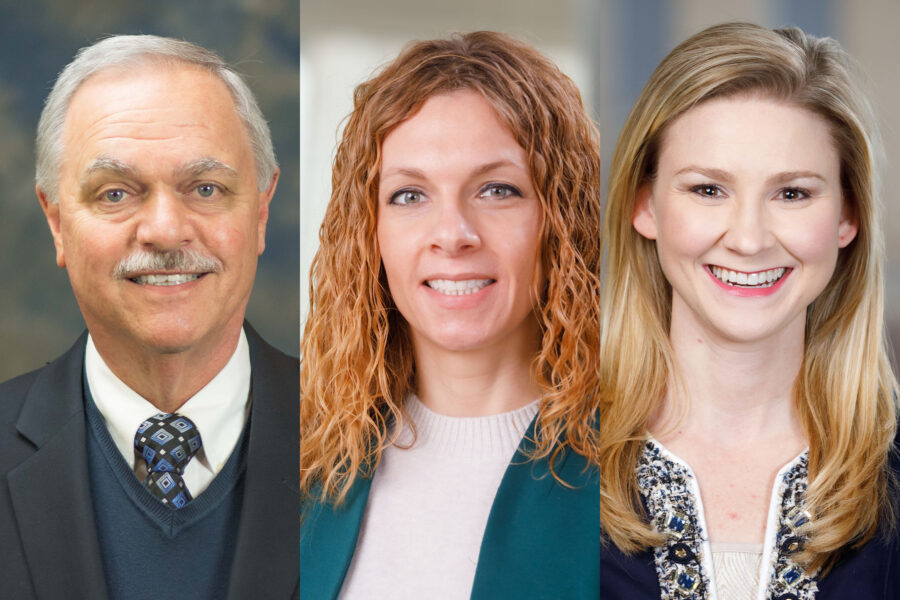A unique BHECN partnership of graduate-level education programs brings competitors and workers from multiple disciplines together to strengthen Nebraska’s behavioral health workforce.
Formed in 2016, the partnership – called the Nebraska Behavioral Health Education Partnership (NEBHEP) – is beginning to attract national attention.
The partnership was created to increase awareness of the statewide need for behavioral health services and provide a unified voice for behavioral health education programs, said Joe Evans, PhD, BHECN’s clinical director in 2016.
NEBHEP’s effectiveness has caught the attention of people outside of Nebraska. BHECN will give a presentation about the partnership in September at the National Academy for State Health Policy Conference in Nashville.
The partnership’s first events included informal dinners among partners, and there was initial skepticism about how effective NEBHEP could be, Dr. Evans said, adding that many participants also competed for students and patients.
“It became clear quickly, however, that the partners had many areas where they could collaborate,” Dr. Evans said.
Bringing together partners who are competitors is one of the more innovative aspects of NEBHEP, said Kati Cordts, PhD, BHECN’s associate director of education and training. In her role, Dr. Cordts oversees NEBHEP, which is composed of 19 academic institutions that provide graduate-level behavioral health education in Nebraska.
“At first glance, there might seem to be little reason for many of our partners to work together, considering there are indeed areas where they compete,” Dr. Cordts said. “But the reality is there continues to be ample room for them to work together and learn from each other, and this has powerful ramifications for our state’s workforce.”
David Hof, a counseling professor at the University of Nebraska at Kearney, said one basic way NEBHEP has fostered collaboration is that partners will refer potential students to each others’ programs.
“Through the partnership, I have gotten to know other counseling programs in Nebraska, and there are times when our program doesn’t have room for more students that I recommend they apply for other programs at different institutions,” Hof said. “The bottom line is, we need to get more students trained and into the workforce. In that regard, we are all collaborators when it comes to caring for those who need our services.”
For Sara Banzhaf, DNP, track leader for the Creighton University College of Nursing’s Psychiatric-Mental Health Track, NEBHEP collaboration has helped her better understand the challenges that face other behavioral health workers.
This increased understanding has helped Dr. Banzhaf’s program train students to be stronger partners and collaborators when they become practicing professionals. This stands to benefit the patients they treat, she said.
Input from partners also has helped BHECN create educational programs and other offerings designed to meet key state workforce needs, Dr. Cordts said.
Those programs include:
- Stipends for behavioral health students interested in working in rural and underserved areas and corrections settings; and
- BHECN’s Lifelong Learning Fund, which supports professional development opportunities for behavioral health students and professionals.
- BHECN’s student advisory board, which allows students to provide input regarding BHECN programs and initiatives, also was born following conversations with NEBHEP partners.
“Being able to incorporate our partners’ input into our program development helps us ensure we are being responsive to those who do the work of educating our state’s workforce,” Dr. Cordts said.
The partnership is a good source of data that helps inform programming decisions for BHECN and NEBHEP organizations.
“The graduation data collected by NEBHEP allows us to analyze trends comprehensively and provides an opportunity for a broader assessment of workforce development needs,” said Susan Reay, EdD, director of the Grace Abbott School of Social Work at the University of Nebraska at Omaha. “Working together with other behavioral health degree-granting programs, we can address grand challenges and work towards improving mental health services for people in Nebraska.”
The data collected from the partnership contributes to BHECN’s research efforts, as well. A recent example of this includes data from a survey of NEBHEP partners that shows Nebraska higher education institutions have experienced a significant increase in student applications for behavioral health programs but not enough faculty to instruct the students.
“This data could be a powerful tool to BHECN as we look to design initiatives and programs to help address our state’s behavioral health workforce shortage,” said Marley Doyle, MD, director of BHECN. “It also can be instructive to academic leaders, policymakers and others.”
The partnership also serves as an internal model for BHECN as it looks to create similar collaborations in other areas. For example, BHECN’s new Behavioral Health Training Partnership, which brings together interprofessional, interdisciplinary clinical training partners such as Community Alliance and Richard Young, was modeled directly after NEBHEP, Dr. Cordts said.
BHECN also is working with those who received awards as part of its American Rescue Plan Act (ARPA) Awards Program to create a network of Nebraska behavioral health providers, Dr. Doyle said.
“NEBHEP has become a powerful network and an invaluable resource to us in our mission to grow the state’s workforce,” Dr. Doyle said. “The ability to bring so many people together to get their input and expertise has had anticipated and unanticipated benefits that are hard to enumerate.”

We are so proud to welcome Dr. Cordts as a new faculty member in the Department of Pediatrics, where she will continue this outstanding work.
Congrats Dr. Cordts and team!
Awesome! Love this!
Congratulations Kati so proud of you and your Love and dedication to your profession